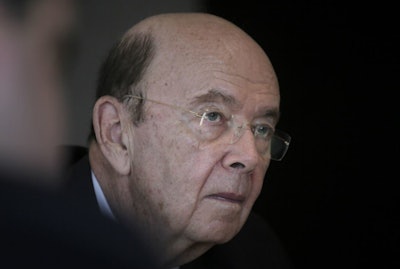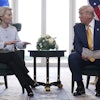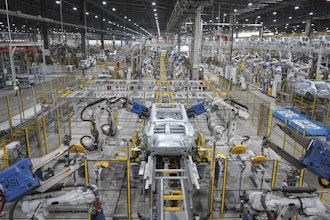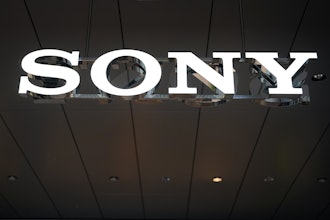
U.S. Commerce Secretary Wilbur Ross said Wednesday that the Trump administration's priorities as it prepares to tackle "bigger" and "more difficult" trade issues with China are better market access, less protectionism and protecting intellectual property rights.
Ross spoke to reporters in Hong Kong after visiting Beijing, where he said he made it clear to Chinese officials that "we do need major change" in the U.S-China trade relationship, which he said "is too lopsided."
Ross met Premier Li Keqiang, China's top economic official, in Beijing as part of preparations for President Donald Trump's visit to the country in November. He will also lead a senior trade mission to China that month, the Commerce Department announced Tuesday.
Trump and Chinese President Xi Jinping met when Xi visited the U.S. in April, in a meeting where they agreed on a 100-day plan for trade talks to address Trump's complaints about China's swollen trade surpluses.
Ross said that while those talks have yielded some progress, such as a deal to let U.S. beef into China, "we're looking for bigger things and more difficult things than what we had in the first 100 days."
He didn't elaborate on specific issues, saying only that at the top of the list is "better market access both for companies operating there physically and for companies exporting there."
The U.S. also wants less protectionism and more respect for intellectual property rights from China, Ross said.
"The U.S. is actually the least protectionist of any major country and China is one of the most protectionist," he said, while adding that the "frankness and an openness" he saw on his visit to Beijing made him optimistic about the negotiations.
Trump has slammed China's large trade surpluses with the United States and ordered an investigation into whether Beijing improperly pressures companies to hand over their technology in exchange for market access. Last year, the U.S. ran up a $347 billion trade deficit in goods with China — accounting for nearly half the total.
Xi, who took power in 2012, and other Chinese leaders have vowed to let market forces have a bigger role, give equal treatment to foreign and Chinese companies and roll back state industry's dominance. But reform advocates complain little has been done to fulfill those pledges.
Ross raised concerns about Chinese government support measures aimed at helping develop key industries like robotics inadvertently leading to overcapacity.
 U.S. Commerce Secretary Wilbur Ross prior to a press conference in Hong Kong (AP photo)
U.S. Commerce Secretary Wilbur Ross prior to a press conference in Hong Kong (AP photo)China has been making a big push into robotics as communist leaders seek to take an early lead in emerging industries. Out of about 400 robotics companies in China, Ross said "people in the industry tell me their estimate is that 360 of those are in it to get subsidies and tax breaks and are not really that serious about the products."
On North Korean sanctions, Ross said the U.S. would keep them up as part of efforts aimed at denuclearizing the Korean Peninsula.
"We've been trying to go step by step gradually increasing the economic pressure on North Korea," Ross said. "If nothing else happens in terms of other alternative solutions, you can bet the U.S. will increase the pressure as best we can."
Ross also commented on a Commerce Department decision on Tuesday that Canadian plane maker Bombardier should be hit with tariffs on its C Series aircraft in a dispute with Boeing, saying it was part of playing fair.
Canadian Prime Minister Justin Trudeau had threatened to stop doing business with Boeing, which is in talks to sell Canada 18 Super Hornet jet fighters. British Prime Minister Theresa May also raised it with Trump because Bombardier employs more than 4,000 workers in Northern Ireland.
"It's not out of any anti-Canadian or any anti-U.K. or certainly any anti-Northern Ireland sentiment, but even with your friends and even with your allies, you must obey the rules," Ross said, adding that the decision was preliminary and a final ruling is expected in months. "The consequences are what they will be."






















